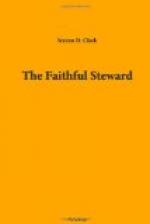3. That God created us to occupy a position near himself. As all our springs are in him, communion with him was to be our life and joy. We were to be full of God; to see him everywhere and in everything, and to value nothing only as the work of his power, the fruit of his love, or as showing forth his praise. We were to dwell so far up the mount, that earthly objects would appear insignificant; approach continually its lofty summit, till our views of the world and the glory of it should harmonize with God’s views of them; for not only were our feelings to accord with Jehovah’s; but also our sentiments concerning sublunary things were to be in unison with his own. So familiar were we to be with the glories of our spiritual existence; our tastes and moral sensibilities were designed, by intercourse with Infinite Purity, to become so elevated and refined, that the glitterings of gold, and the fascinations of wealth, would fail to charm. Our home was to be so near the throne, that its light would perpetually shine in upon our souls; its spirit always bathe our spirits; so that seraph-like, possessing the benevolence of heaven, we should breathe the love of heaven on all around.
4. That merely becoming rich is not the great object for which we were sent into the world. Man’s being aims at a higher goal. This is a point which should be distinctly understood; and to bring out the thought clearly, I will make two distinctions. 1. The very obvious difference between benevolence and indifference to property or its acquisition. Benevolence means “wishing well,” and beneficence “doing well,” to others. Benevolence, then, bears no resemblance to undervaluing money. I know that the gentleman who used to skip his silver dollars on the fair bosom of the Connecticut for the amusement of his friends, and he who freely tosses around the social glass to his boon companions, may be pronounced generous fellows. But such may be as entirely destitute of all true benevolence as the most determined miser, and, what is more deplorable, as offensive to Infinite Love. Property is God’s gift, and he does not require us to undervalue his gifts, but to use them with his own good-will to men. To be willing that our labor or capital should be unproductive is no indication of a faithful steward. 2. There is a difference between the design of becoming rich, and that of acquiring property. The latter, under certain restrictions, is a duty incumbent on all. One may have a peculiar talent in this direction;—a turn for business, a sagacity to lay plans, to foresee the favorable changes in the commercial world, and all that shrewdness so essential to success in the career of opulence. It is an endowment of heaven, and should be used in such a way as heaven will approve. While regulated strictly by the principles of Revelation, it should be employed in the acquisition of property, as a means of usefulness. But it is a common




